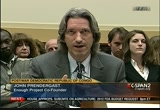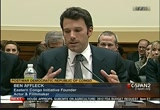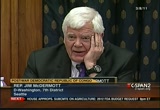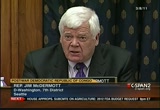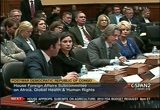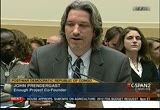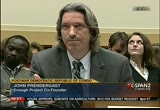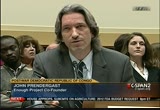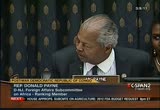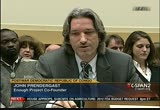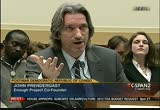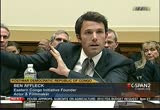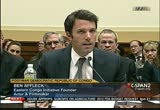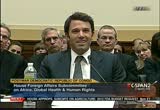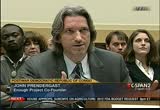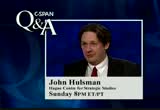tv Close Up CSPAN March 11, 2011 7:00pm-8:00pm EST
7:00 pm
kinds of crimes in congo of military officers or soldiers who are involved in this kind of stuff. then we're going to -- that sends a signal so there's the building blocks to a state and i think africum for all of the controversy and other fronts can play a major important role in the congo in helping to build that particular block of the larger foundation. >> thank you. >> yeah i think the relevance of africum there has to deal with -- look, monossko does off. training now. they work together, they train guys. they're having difficulties. we're better at it than they are. i met some of our guys down there doing some of this work. obviously they're great guys. u.s. military. they really know what they're doing, men and women. they're doing -- just training very few units. that's good. it needs to happen. and i hate to have all of these answers woman caviates and then i don't want it to feel like, well you have to do everything, but really there has to be accompanied by some reformed units that they have to go back. huge, huge problems is soldiers
7:01 pm
don't get paid. the legacy. destroyed the infrastructure. eaten up all of the money. there's a little bit of that left. not a little bit, a lot, unfortunately. i have visited the battlion camps like tent cities. a little better than the revfeefgy camps in fact they often go and loot and pilliage in those camps. are responsible for 40%. some say of the rapes in the country. where you have a military that's deployed among the population that's feeding off of the population. it's not imaginable to us. this is a horrible i version of that. i think they just took the divisions out of there. that's not practical politically, but what is practical is to go around and just train troops on one side. i would love for us to take over a little biltmore or do training of the guys, but on the other side, get people paid. make $40 a month being a soldier, but at least it's enough to buy what you need where you're not compelled to.
7:02 pm
i mean, they walk. it's 800 miles. they walk that far. you know, it's like ancient rome. >> thank you, mr. chairman. i'd like you to respond to the need for pepfar being money being included for the congo in the treatment particularly in terms of maternal infant transmission of aids and the fact that pepfar does not affect the congo. that's one thing i'd like. and the second thing is, i think you get a little more humble as you go along in this business. and you realize that passing a bill isn'ting that it's cut out to be. you can have the champagne, have a good time and clap your hands and be happy. it really is writing the rules and regulation where it really happens. and that's going on right now.
7:03 pm
and i would like you, john, to talk about what the committee can do. because you put this up as an action item. what the committee should be looking for in the writing those rules and regulations as to whether they are good rules and regulations or rather they're slippery. i've been doing this long enough to know that you can't hardly write a law that somebody can't figure out a way to get around. so what i'm really looking for is the best set of rules and regulations that we can have to make this law work and what things we as a committee should be looking at, or we as a congress should be looking at. >> congressman mcdermott, i'm sorry, i can't answer that question because i don't work in aids relief and i'm not familiar with that kind of programming.
7:04 pm
>> i don't know the specific answer on pepfar, but i think between us, between our staffs, we can get back. >> i know it's a problem in africa in goma because i know where they're getting their drugs. >> right, they are short on drugs. in fact, particularly -- what was the program? anyway, there are shortages. pepfar is a great program and obviously people get access to those drugs and it's important. we could furnish the committee with details of that. >> i was asking a softball so you could let the committee know, but go ahead. more tough question is the regulations. >> i think that the top two i would say for the s.e.c. regulations, they're getting bombarded right now because the industry, you know, lost that battle on the hill. and they are mad, and they're coming back with the los of lobbyists to try to press the s.e.c. to water this thing down.
7:05 pm
like you said, so keep the cork? the champagne yet, you're absolutely right. number one, i think that there be stiff fines for companies that do not fly with the intent of the law. do not open up the books to demonstrate that their supply chains are indeed free of conflict. and if they're not, they're acknowledging we got it from there and yes we know where it came from and consumers you can make your choices. but if you try to hide it, circumstance uvent it, then ser fines. secondly, i think is the question of when this all should come into effect. and i think one of the big things that you're seeing lobbyists push for now is a significant delay in implementation. we haven't yet seen the state department make its own recommendations in this regard, but i talked to a senior member of the administration last night who said that they were going to not advocate for a delay.
7:06 pm
i hope that his opinion is actually the -- ends up being the u.s. government's opinion. but right now the s.e. krmplgc. hearing from industry sources that they can't comply with all this. although other companies, you know, particularly within the electronics industry, they've been working on this now for a couple years, partly as a response to the legislation but partly also because some of them want to do the right thing, and they've shown very clearly that they can do what is required to do with respect to the law. apple, you know, a year and a half ago apple was not much of a contributor to the electronics industry association and its efforts to try to clean uppity supply chain. basically, their argument, if you talked to them about it was look, we have no idea where this stuff is coming from. how can we possibly be expected to know? it's a war down there and where it comes from is not really something we can control. well, a week ago, now we've had
7:07 pm
the legislation, we've had mr. jobs actually get personally engaged, and his wife, and now a week ago apple put out whatever report that it does, and it was the most robust reporting of any company on where their materials are coming from. right down to the smelters, to the processors. i mean, this is something, again, the lobbyists said a year ago even that were working for apple said it was impossible. you know, basically, i think this is what the legislation is going to be able to do. it's going to urge people to actually do the right thing when they've said for quite a long time they can't. they actually can, so the question is how fast are they going to have to do it? and instead of, you know, a delay of a delay or two years or whatever some of these guys are asking for, we'd like to see the timely implementation of the regulations and to come into force very quickly after the s.e.c. makes its rulings. >> keep on making the publicity
7:08 pm
to keep it up above the radar. thank you. >> thank you. just to add one note, catholic relief services did write the s.e.c. to ask for the absolutely most strongest rules possible. and we hope for the timely implementation as well. thank you. >> thank you. >> thank you, mr. mcdermott. any final thoughts? >> i just want to say that we do have to really make sure that they don't change, what was interesting years ago i was able to encourage congressman tancredo who was working with me on sudan to get a bill passed in the house that capital market sanctions were put in. in other words, if you were doing business with them, you had to come out of wall street. and we passed it in the house. that's where it ended.
7:09 pm
the lobbyists ran over to the senate, the head of every top -- mr. tancredo who was great on sudan, we didn't have champagne when it passed, but we were very happy. and it simply died by virtue of the lobbyists saying, you can't do that. so hopefully we will be able to push this through. i just have comments from the international crisis group that would like to add their statement for the record. mr. chairman. >> without objection. >> thank you. >> thank you. >> i'll just conclude by thanking you. i would like to ask, mr. pendergrast, how well or poorly do you think it's being implemented, what is it from your perspective, anyone else who would want to touch on it as well? >> thanks for bringing that up. i should have at least in my testimony. i think it's such a crucial
7:10 pm
element of overall security and stability in central africa. we've battled internally within our organizations and the groups that care about the nrla. we've put out this report card, and i was trying to give the administration ds and fs. everybody was, like, no, they'll just demoralize everyone. i feel like there is one major thing that has to be done. i mean, the elephant is swinging its tail around the living room is that you have to create a focused military strategy to apprehend or whatever the leadership of the lords resistance army. as long as joseph coney continues to run around, we've presented him with a very fair peace deal, peace proposal which he didn't even bother to show up to not sign. so there's a military option that needs to be exercised. what has happened now over the last three years is a broader counterinsurgency strategy where millions and millions of dollars and thousands of ugandan troops are running around central
7:11 pm
africa attacking units, and often those are conscripted child soldiers. i don't think that kind of a broad counterinsurgency strategy has any chance of working. we need to target the leadership, use our technical assets that are superior to anyone's in the world, ensure that they're out there. we robustly support a commando unit to be able to close and act on a hot lead and take these guys out. hopefully we'll apprehend them and send them to hague and there will be a great trial and the icc will have a major success. if not, let's do what we have to do to bring an end to this tragedy because the attacks in the congo are getting worse, not better. we've seen almost an attack every week over the last few months in northeastern congo. and these are remote areas. no one knows. every once in a while a report trickles in and makes a little column in a local newspaper here in the united states. that's not even -- we're not even looking at this anymore. so we have to refocus and say what is the thing that's going
7:12 pm
to end it? that's the catalyst i think that will end it. >> i think he makes a really good point. absolutely i've seen people, i've seen evidence of this stuff and people who are after it. there are really good people involved in trying to pursue some of the goals that john's talking about. and you do hear every month or two, well, 400 people got killed. oftentimes it will two, three days or a week to even come through. and then i think it's equally important to maintain a focus on the fdlr in eastern congo. they really are the people that -- well, in their leadership now committed the genocide, then fled to zaire, injected this toxic poison. it wasn't like people weren't raping one another in zaire. that's where everyone in rwanda was going to party and dance when rwanda was the uptight couldn't friday in the easterrl '90s. these people who committed these
7:13 pm
barbaric crimes, it got contagious and further ruptured the social fabric, two wars and obliterated the infrastructure. these guys are still there and they're still killing civilians all the time. they're a big part in who's committing the rapes and they're the big ones that we need to support the effort to do that despite some pushback. i think it's important to remember there's the cndp. obviously they've committed a lot of crimes and they're part of the army -- congo has very openly said peace first, justice second. they're in a tough spot with that kind of thing. the fdlr there's no question about. that part of the country will not be safe until that militia is dealt with as well as the nlra. thank you. >> one final statement or question. there's no doubt that senator
7:14 pm
danforth, had he not initiated the work with regards to the comprehensive peace agreement in the congo, there probably would not have been a comprehensive peace agreement. in sudan. and in like manner in northern ireland had it not been for senator mitchell, it is unlikely that a peace agreement would have been hammered out there between two disparate parties that were at each other's throats for decades. one last appeal, when ambassador yamamoto said he would take it under advisement with regards to the special rep or special envoy, i didn't get a very strong sense of affirmation there. if you could, all of you if you'd like, make one final appeal to the administration, because time is running. and the fear is that if we don't have someone who can really cobble together all the disparate elements here and really push hard, this may be opportunity lost. >> yes, i just would like to
7:15 pm
reemphasize that it's the key thing if we're going to see success in the drc. and it's vital. and finally, i certainly would like to commend you, ms. mccain, for, you know, when you said you've been involved since 1994 to continue to be way ahead of the curve, i really commend you for that and for your continued interest. thank you. >> yeah, thank you very much. on the special adviser. i haven't heard any good arguments against it. we've been talking about it and going everywhere and asking about it. no one can tell me why it's a bad idea. it's the one appointment i could say potentially who knows? 100,000 lives? 500,000 lives? a lot. it will make a big difference if it helps prevent another outbreak of violence and destruction. i don't know washington. i'm not an expert. i hear it's a tough place because you've got turf battles and bureaucracy. fortunately that's your business and not mine. i'm really pleased to be
7:16 pm
encouraged by you and to be empowered by you to continue to advocate for this because i, too, think it's really important. and i know that ambassador y yamamoto will give us his support. it would really help us to go to the secretary, if necessary to president obama. thank you again. >> mr. smith? >> you might ask -- you've been asking probably why we should have it. maybe we should just turn the question around and ask why not, see if they can come up with an answer. >> yes. >> chairman, you started off speaking about the elections. and i think that my final appeal would regard increasing women's political participation. as i said before, we're at a critical juncture, and we're not seeing women represented. in fact, not only are they being
7:17 pm
sidelined, but they're being cast out of the process. and to give you an example, after enduring sustained pressure by their male counterparts, three female mayors in south kebu, grouping of cities, quite a high position, in fact, administrative position, were forced out of office. the bishop of vucavu had gone to them and tried to encourage them to carry out their political mandate and represent women and girls' needs. and finally, in november, they were fired. it's unacceptable. and if women do not represent themselves and their needs, their health, their education needs, then who will? we're not seeing others in the drc represent their needs. so that would be my final appeal. thank you. >> i think we need to understand that the system is like we've
7:18 pm
got this. we've got this under control. system doesn't like aberrations. they don't like these things like special envoys and other kind of exceptions to the rule. that's just the way institutions work and the state department is no different than any other institution. my understanding is, and this is what i fear, and this is what i think -- and i'm glad we got our last chance to say this because i want to impart this to you, is my fear is that they're going to give this position. they're going to create the title of it and then give it to a deputy assistant secretary of state. they're going to dual hat a deputy assistant secretary of state and say yes, that's going to be our point person, our lead person. again, no human being has enough time to be a deputy assistant secretary of state of any regional bureau in the u.s. state department and be a special envoy to one of the most complicated countries in the world, definitely the most complicated i've ever been in in 25 years orcing in africa. that would be a tragic mistake. secondly, i think that position
7:19 pm
needs juice, sorry to use a hollywood term, you need influen influence, gravitas, someone who can make the system respond to different ideas, new ideas to doing things in a way that are actually going to get results and bring an end to something rather than manage symptoms. and that person -- that person needs to report to the secretary of state as opposed to being just only in a regional bureau. i think these are the keys to success. and if we don't have them, it's just going to be another spoke in a wheel failure. >> thank you. ms. mccain. >> lastly, i would just like to thank all of you again for paying attention to this issue, for listening to us, for allowing us to tell you our thoughts and where we think the most important parts lie. and most importantly in chanting this issue from here because we'll be following you. we're going to watch. and we really encourage you to continue in such a wholehearted way. as a mother and the only thing i
7:23 pm
next more on u.s. foreign aid with converse woman. the ranking woman of the appropriations subcommittee on state and foreign operations was a guest on this morning's washington journal. this is 35 minutes. >> thanks for being here this bh morning.er we have a lot going on today.we i'm going to start with libyao t test because the secretary was talking about it. again, the leaders of europe are meeting are meeting, france pushing for a no-flight zone. what are your thoughts about the u.s. involvement level? how big should it be? why is that a good -- disco hit it is clear to me after discussing this in debt -- guest: the administration is
7:24 pm
actively involved in strategy sessions and discussions with the international community. the united states cannot act independently. people may say no fly-zones, they may come up with all kinds of actions, but, number one, there are implications as secretary gates said to every one of the proposals. unless we act with the international community, i do not think it will be affected for us to take any action by ourselves. we have spoken out publicly. it is absolutely apparent that its leader is shooting and killing his own people. i hope there can be some consensus. host: we were anticipating that the big story would be saudi arabia.
7:25 pm
we heard some reports that there may have been some government shots fired into the crowd as they were assembling last night. it is all but eclipsed by japan and the earthquake followed by the tsunami. guest: i just came back from japan as a part of a congressional exchange program. they are good allies. they have been an active member of the six-party talks in the region which is so very essential. this is just devastating. when you read the reports after you just met so many members and their leadership and you have been in their homes and you have had such in-depth discussions over three or four days, to see this happening is just devastating. japan is probably one of the most organized places i have ever visited. the streets are clean.
7:26 pm
the people are polite. there is a plan for everything that has to happen. i know that they have been preparing for a possible earthquake or tsunami for a long time. preparing for it and then responding when the tall buildings are shaking and people are losing their lives, hopefully the lives lost will be kept to a minimum because of the preparations. host: this is also a domestic story. the waves are beginning to reach the coastline in hawaii. it is scheduled to do so right now as we are speaking. if you were just treated to us that oregon coastal areas are being evaluated. this.r is great ofor i want to talk about foreign aid
7:27 pm
spending. let's use an example of japan. when something of that magnitude hits, the international community gets involved. we send resources. how do we budget for federally unexpected disasters? guest: first of all, our foreign aid budget is 01% of our total expenditures. i believe with many of the new members of congress that we should be evaluating every program, cutting out waste, fraud, and abuse. certainly there are programs that may not be as efficient as others. even in the foreign aid program when i was the chair and ranking member, we worked together in a bipartisan way to make sure there was oversight. we are sending billions of dollars to afghanistan, billions of dollars to pakistan. the total budget is only 1%.
7:28 pm
i got a deep, black. about the $3 billion that was on a palette going from afghanistan. i immediately held up all that money until we came to a conclusion and an understanding as to where that money came from and where it was going. we provide excellent oversight on our foreign aid budget and weekends to do more because we have -- and we can still do more. when you see what happens in japan, they do not get foreign aid. in disasters such as what happened in haiti, we can respond and we do respond. number one, it is in the interest of the national security of the united states to respond to disasters. we know that when communities
7:29 pm
and countries in turmoil -- this can cause tremendous action on the part of terrorist organizations such as al-qaeda recruiting people who do not have food, clothing, or clean water. i think it is important to remember 1% of the budget. our national security depends on defense, diplomacy, and our budget. host: i want to put a set of numbers on the screen and then go to your telephone calls. we are going to be out early today because house will be in session a half hour from now. the present for this fiscal year requested $56.7 billion. the amount suggested in the continuing resolution by the house, $45 billion.
7:30 pm
you have been speaking saying that is shortsighted. guest: number one, our national security, the united states of america depends on defense dollars. those are being cut, too, but not in proportion to foreign aid. defense, diplomacy, and development. turmoil, terrorists -- they find a very for tile soil when they are in communities that are lacking the basic essentials of life. it is in our interest. secondly, we are amoral society. ithere are many people who support foreign aid because they understand it is important to help people whether it is hiv aids, malaria, drinking water. i have been to some countries where family planning is not adequate, and women who can
7:31 pm
barely support their children are having a ninth or a tent child. it is in the interest of the united states. we are a society thatelieves ave to b .. others. host: one last article and then to your calls. the treasury secretary has been on capitol hill trying to make the case for maintaining funding levels for key foreign aid programs. here is the headline. >> host: tim geithner, treasury secretary scad in congress as the world's bank
7:32 pm
failure to finance the capital increase would lead to the loss of u.s. pour to veto changes to the governing agreement. remarks show that cuts to the contributions will come at a price that may be hard to sustain. it makes none of its promised contributions to a range of u.n. and world bank funds for the environment and food security. that's the heart of the discussion with ms. lowey. let's get your telephone calls. go ahead, please. >> caller: hi, i just want to tell the representative that my feelings is that we should have absolutely nothing to do with the libyan conflict. the best thing we could do is
7:33 pm
have the president step up and state the that european union and islamic countries need to solve this. i don't care anymore whether we are humanitarian or whatever we are. this isn't our fight. i have a son in the united states navy. he is in the enterprise battle group. he is currently deployed, and the last thick i want to have -- thing i want to have happen is him standing off the coast of libya and our blood and treasure going to something that is not our fight. >> host: thank you, kathy. >> guest: and thunk, kathy for your elegance and please, god, i hope your son will come home soon, but we have to understand that we are not living in isolation, and i want to go back to go back to an article that was written about the banks.
7:34 pm
we are focused like a laser beam on jobs, that's what we should be doing, creating jobs and putting people to work and the banks by creating markets overseas by developing training and partnerships with other countries creates jobs because the exports to the jobs are increased, so it's not just because we're good people, although we are, and i mentioned before it's in the interest of the united states, and when it disaster occurs, we have an obligation to be helpful and i know we will when we're in haiti in responding to other disasters. >> host: necks, idaho falls, independent, you're on next. >> caller: thank you. what i would like to know is i see some money going out for my
7:35 pm
cro loans, clean water, things like that, and i see a lot of money going out for military aid to governments that are not necessarily too nice to their people, and i would like to know the proportion of military aid we're sending to actual humanitarian aid. >> guest: well, that's a good question. it's about 20 times or more and i happen to agree with you, and secretary gates and general petraeus and admiral mullen, head of the joint chiefs has made that point very well. we see in afghanistan that the civilian aid is absolutely essential to resolving this conflict, and we're putting many, many billions more dollars in the defense program than in the civilian side, and i think that has to be changed. hopefully, it will be in my lifetime.
7:36 pm
>> host: westcherter, new york. anne, you're on. >> caller: good morning, i'm from westchester county. >> guest: oh. >> caller: yes, i am. i would like a town meeting so we can look eye-to-eye not a town meeting where you're on the telephone to ask questions. how is it a national interest in involved in helping women have babies in other countries? how does that help our natural interest? the other two ladies, the lady before me from long island, we're involved in other countries, giving money to their military. a couple years down the road, their knifing us in the back. stop giving all this aid to governments. let them figure out what to do, and for heaven's sakes, it's not
7:37 pm
our national interest to give money for people to stop having babies in third world countries. it's here, here, we have to help our own united states citizens. that's what i'd like to say. maybe one of these days we'll have a nice big town hall meeting where mrs. lowey is actually there. >> guest: let me suggest if you are a constituent, i've been in office for 22 years, and every year i've been doing at least a dozen office hours, i go to supermarkets and libraries. call my office. come to my office. i'd be delighted to meet you one-on-one, and i think it's important for us to know that we don't live in isolation. we're all connected, and the days of one part of the world not getting to the other part are over, and what happens be it
7:38 pm
in japan, what happens in china, what happens in afghanistan, pakistan is certainly reel vaunted to -- relevant to our own security here, and i mentioned the banks before because i'm very concerned about jobs in westchester chon, and i've worked hard to get spa loans so that we can help businesses expand, but in terms of international assistance, again, we export to japan. they export to us. we export to china. they export to us. we are all interconnected, and by the way, when there are asian flus, those are exported too. let's fight it over there and deal with the flu be it an outbreak in china, be it an outbreak somewhere else. i'd be happy to talk with you further. come on in. >> host: trying to give you news updates on the earthquake
7:39 pm
and tsunami talking about the federal spending priorities. bbc breaking news. this is a sad story. 300 bodies were found in one city according to japan's news agency, and retweeted by bbc news. next phone call as we are talking with congresswoman lowey. robert, democrat, go ahead, please. >> caller: yes, i just want to say i believe in june 48 the people and people were aware they needed helpment a lot of this money goes to governments that just keep it for themselves. when i was growing up as a kid, i was five kids in a family with a mother. my dad got paid every friday, and you wouldn't see it until sunday afternoon while the family was home starving. i think they need to do more this this country too. it's the have and have not's,
7:40 pm
and it should stop. thank you. >> guest: thank you, sir. a good deal of our aid is delivered through organizations like save the children or care that are working with families, with villages. there is a small group in guatemala, for example, that is training people to make products such as pocketbooks so that they can sell them and support their own families, but let's remember, again, we are living in a global economy. we are living in a global world, and if there are diseases abroad, they can come here, and if there's a disaster abroad because of the good nature of the united states of merng, we do -- america, we do want to assist people like in haiti. mexico, on the border of texas, we may be assisting and training the police force and military,
7:41 pm
but it's in the interest of the united states of america keeping us safe here to help those in mexico. >> host: how is your working relationship with the new chair of the committee, cay granger? >> guest: she's a delight. she's from texas, and when i was chair, she was ranking, and now she's chair, and i'm ranking. it may be the only committee that there's two women. maybe that's why we work so closely in a bipartisan way. >> host: you find consensus in the committee? >> guest: there is no question, and many of our priorities are the same, and we're looking through the whole budget to make sure that every dime is spent effectively and that there isn't race, and the gentleman talked before about delivering funds to the people rather than the governments. corruption has been a big issue to me as it has for secretary clinton, and, in fact, recently when the president, -- tried to
7:42 pm
raise taxes on the elite, there was a mass demonstration. if we're giving aid to pakistan, there should be more people paying their taxes, especially at the top level. >> host: next phone call from new york. this is tim on the republican line. good morning. >> caller: good morning. actually, i'm a tea party member more than a republican because i'm surprised by cuomo who is doing good things for the state. i'm mad at the entire congress. you know, our debt payments are four times larger than the entire state department budget. we are destroying this country with the massive level of debt that we're piling up, and neither party is willing to do anything. one party is offering a third of a percent, and one party is offering 1.6% while racking up debt in exponential levels. >> guest: i've known andrew
7:43 pm
cuomo since he was a kid in queens, and i'm proud of him. i think he's doing a good job. secondly, i happen to agree that we have to tackle the debt, and it depends how. i am opposed to the $40 billion in subsidies to the oil industry. there are many special cause-outs for large corporation and businesses that we have to attack. there has been a major assault on appropriation earmarks, and i think, and i've always felt you have to be very careful when you provide a legislative directed earmark, but no one is looking at those special give aways, and i think we have to do a lot more because addressing the debt is essential, but you can't do it with a sledge hammer. you have to do it with a scape l, and when teachers are laid off with hr1 in the house,
7:44 pm
teachers would have been laid off, head start programs cut, title i programs would have been cut, money to the national institutes of health that provides research for cancer, alzheimer's, cancer, diabetes would have been cut. i hope we can have a bipartisan solution in the senate so rationality prevails rather than the hammer approach to just cutting. >> host: viewer mary on twitter writes i believe in foreign aid to people. first it goes to corporations with no oversight. look at hay -- haiti's government that equals looted aid. >> guest: there has to be a balance. we provide a lot of money talking about haiti to the nine governmental organizations. there's over 10,000 of them in haiti, and they are there to
7:45 pm
deal with humanitarian services who help build better schools, but unless we train the government, unless we work with the institutions, i am very concerned that we're not going to accomplish what we really have to do, and that is remove ourselves. the nine governmental organizations can't be there forever, and the institutions have to be trained to deliver the services, and in haiti what i want to see if we're going to try to develop communities outside of port-au-prince, i want to see what i call a community of learning, a school as the center of the community, and around that, job opportunity, a big korean firm just announced that they were going to have a business in haiti. well, if we have it next to a school, a health clinic, we can keep people in these communities and train people so they can be
7:46 pm
independent. that is the purpose of foreign aid to help people help themselves, not to constantly be a presence. >> host: next call, another new yorker. william, democrat. >> caller: yes, i would like to see the congresswoman several reasons why the budget should be severely cut. first, the dea has officers in 63 countries, and that's way too much, and the second reason is that 15 states passed unitization of medical marijuana and the states are trending towards that, something congress is lagging behind on with the public on this. it's something that needs to be cut. it's no longer taxable. it's a drug war that we're sporting, and i think the people need to question it and so does the congresswoman. >> guest: thank you, sir. i say to you that the legalization of drugs is a debate that we really have to
7:47 pm
have. certainly in mexico when you see the drug cartels that have infiltrated the military, they infiltrated the police, our guns, assault weapon bans, our guns going over to mexico, and the drugs coming from central america to mexico to the united states, we have to work on our drug control programs here. we have to try and do something about more accepting programs to stop people from getting addicted to drugs, but i think the legalization of drugs is clearly a debate we have to have. >> host: next call is from the bahamas. zach, you're on the air. >> caller: yes, susan. financial times -- 48% --
7:48 pm
[inaudible] >> host: i did not know the ownership and qaddafi's involvement. >> caller: you check it out and report back, but the question is actually you strike me as very naive when it comes to foreign. i surprise you're on the foreign committee. you talk -- you -- the european will not take the need. they have a history of not doing anything when things happen even in their backyard. i'm familiar with eastern europe. i have background from there, but the killing, anything is better than qaddafi i tell you. the one leading the freedom fighters, but i am kind of
7:49 pm
surprised that the protesters in libya which you are talking about earlier briefly about, they are sitting ducks. nothing, american aids, maybe some kind of advice to ensure this menace of qaddafi. anything is better than qaddafi. that's my comment. thanks. >> guest: you certainly seem well-informed, and your response is very thoughtful. the secretary of state and the president very aggressively involved in this issue. the secretary of state is going to libya. i think she's leaving on sunday and working actively with other members of the community. our military is in afghanistan. we are in so many spots of the world, and it seems to me although i would like to stop this murder, these killings immediately, but we have to work in coordination with the
7:50 pm
international community. >> host: here's a headline from the "washington post," their lead story today. u.s. plans to send a-team to libya. despite overture and next steps pose a challenge. the white house is facing criticism. you suggest they are actively involved, but there are contribute critics saying they are dragging their feet in stepping up for prodemocracy movements in the region. what's your reaction? >> guest: well, i think words are fine, but action is what really counts, and we have our forces in afghanistan right now. we are actively training and working in pakistan, and i would like to say that there should be a no-fly zone. i know some of my colleagues from my respect have suggested that, but then in my conversations with the secretary
7:51 pm
and others, it is not necessarily the whole solution, so i think our secretary of state going over there with a team this week, the beginning of next week and working with the other members of the community is essential. speaking out and supporting the opposition is one thing, but actually sending our young men and women abroad is another, so i think that they are being cautious, but very directed in their thought process. >> host: moving to the larger discussion over the continuing resolution, the senate rejecting too this week. the leaders are going to announce another short term cr with additional cuts. where do you see this all ending up? >> guest: oh, i wish i had vision that could assure me that we wouldn't be making massive cuts that are really going to
7:52 pm
affect not just my community but all around. look, we have to be very careful when we appropriate at a time a huge debt, and let's remember that when president clinton left the white house, we had a surplus. let's just remember that. we all are part of this effort in looking for ways, looking for flaws, looking for abuse, but you can't use a hammer, and in my district when i talk to several hundred people who are involved with head start, these are working people. what are they going to do with their kids? they are teachers preparing to be laid off because there's no money at the state or local level to support them. police, firefighters, i mentioned before the national institutes of health, so we have to look at this budget. i'm hoping we can do it in a bipartisan way, and come up with
7:53 pm
a plan that doesn't get to the bones of our government and our services to the people. >> host: on booktv, we're going to be taping this weekend at the virginia festival of the books. you'll see that on our network on c-span2. c-span jr. 3 is now history tv, people talking about the american story. live this weekend from the organization of american historians. i believe they are meeting in houston, and there's live panel sessions if you like history on both saturday and sunday on c-span3, and politics and debates on c-span with the continuing budget debates here in washington. an independent on for congresswoman. good morning to you. >> caller: good morning. i appreciate you taking my call. ma'am, in reference to the foreign aid, let's bring that down to the united states grass
7:54 pm
roots. what would the perception be of me if i took my husband's income and went across the road and fixed my neighbor's roof and painted his house and i advised his children, but at the same time, allowing my home to deteriorate? when it comes down to the children, there's ads on the tv that says help feed the children. now they put u.s. children in there, and as far as nafta is concern, i wish they would amend that and not north american free trade, but north american free trade because the blue call lore american labor, the united states is not surviving here. we don't feed. we can't protect. we can't clothe our own. we need to take care of home and then share that family with the rest of the world, but we need to take care of home first. >> guest: well, thank you, and i appreciate your thoughtful
7:55 pm
comments. i visited the food banks in westchester county new york, and the numbers have just increased dramatically not just with people who are out of work, but people who are having low-paying jobs and can't afford to feed their family, and that's why i'm working so hard in the congress to focus on jobs, jobs, jobs. to me, this is what our prime responsibility is, and when the unemployment rate keeps climbing up, we have to focus on jobs, so i agree with you that putting people to work is uppermost. it's why i support the program of the small business administering. in my community, i have seen jobs in the by yo tech -- biotech field gone from 4 to about 1500. another company that installs solar panels went from half a
7:56 pm
dozen people to over 100 people because of support from some of the small business administration programs, so we have to focus like a laser beam on creating jobs, but, again, we don't live in isolation. what happens overseas affects us. if china, for example, is taking our jobs, frankly exporting more than we are exporting, this affects us. i mentioned before the avian flu. people fly. they go and travel around the world. the flu doesn't stay in one place, so we're all interconnected, and when there's turmoil in one part of the world, it can affect us here at home. it's national security issue to invest in aid, and, again, it's just 1% of the budget. >> host: almost out of time with the house about to come
7:57 pm
into session. one last call. travis, republican, good morning. >> caller: great, thank you. thank you for having me on and thank you for the show. i would just like to say just like what the congresswoman head start suspect funded properly, why give financial aid to other countries? i've been to japan. it's a beautiful country. i would move to japan because they are such a great country. i also want to say that we don't need to buy our friends via financial aid. this is ridiculous. why does it look like that's what we're doing, and i can't -- >> host: let's stop with that. we don't need to buy our friends. >> guest: it's not a matter of buying friends, but a matter of developing alliances, working together in the interest of the united states of the america. in haiti, when there's poverty and people don't have homes, don't have place to live, it's not a matter of buying our friends. it's making sure that we can work to bring some stability in
7:58 pm
the country because they are right on our border and the same thing with mexico, but our people travel everywhere, and we're all interconnected, and i do hope, again, that in addition to supporting our alliances and working together, we're going to focus like a laser beam in creating jobs right here at home because that's our first priority. >> host: thank you for being here this morning. >> guest: thank you.
7:59 pm
146 Views
IN COLLECTIONS
CSPAN2 Television Archive
Television Archive  Television Archive News Search Service
Television Archive News Search Service 
Uploaded by TV Archive on

 Live Music Archive
Live Music Archive Librivox Free Audio
Librivox Free Audio Metropolitan Museum
Metropolitan Museum Cleveland Museum of Art
Cleveland Museum of Art Internet Arcade
Internet Arcade Console Living Room
Console Living Room Books to Borrow
Books to Borrow Open Library
Open Library TV News
TV News Understanding 9/11
Understanding 9/11